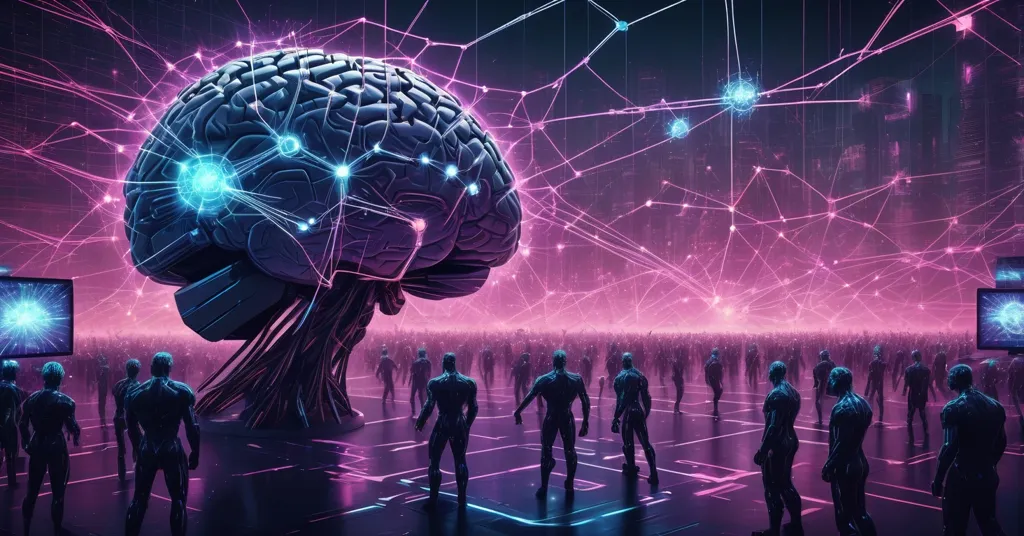Microsoft’s AI Talent Grab from DeepMind: Boost or Threat to Blockchain and Crypto?

Microsoft’s AI Talent Heist from Google DeepMind: A Game-Changer for Blockchain and Crypto?
Microsoft has launched a full-on assault in the Silicon Valley talent wars, snatching over 20 AI experts from Google’s DeepMind unit in just six months, with heavy hitters like Amar Subramanya—former head of engineering for Google’s Gemini chatbot—now stepping into the role of corporate vice-president of AI. This isn’t just a corporate flex; it’s a seismic shift in the race for artificial intelligence dominance that could ripple into the world of blockchain, Bitcoin, and decentralized tech.
- Talent Power Grab: Microsoft hires over 20 DeepMind pros, including Amar Subramanya, to lead AI innovation.
- Strategic Play: DeepMind co-founder Mustafa Suleyman spearheads Microsoft’s AI push post a $650 million Inflection acquisition.
- Crypto Stakes: AI advancements could boost or threaten blockchain’s privacy and decentralization goals.
Setting the Stage: Why AI Matters to the Crypto Crowd
Before we dig into the juicy details of this tech soap opera, let’s get one thing straight: AI isn’t just about chatbots or fancy assistants—it’s a transformative force that could make or break the decentralized future we’re fighting for. Whether it’s optimizing Bitcoin mining, securing data for Web3 apps, or powering DeFi algorithms, AI’s fingerprints are increasingly on the tools we use. So when Big Tech giants like Microsoft play chess with talent, it’s not just their game—it’s ours too. Let’s unpack how this latest move shakes out.
The AI Talent Heist: Who’s Who in Microsoft’s Lineup
Microsoft’s recruitment spree reads like a tech blockbuster. In half a year, they’ve onboarded at least 24 AI specialists from Google’s DeepMind, the research hub known for pioneering breakthroughs like AlphaGo. Leading the pack is Amar Subramanya, who recently joined as VP of AI, having previously run engineering for Gemini, Google’s answer to ChatGPT. Alongside him are names like Sonal Gupta (engineering lead), Adam Sadovsky (software engineer), and Tim Frank (product manager), each bringing deep expertise in machine learning and AI systems. This isn’t random headhunting; it’s a calculated strike to build a dream team.
Driving this aggressive strategy is Mustafa Suleyman, shaping Microsoft’s consumer AI strategy, a co-founder of DeepMind himself, who joined Microsoft as EVP and CEO of Microsoft AI in March 2024 after Microsoft shelled out $650 million to acquire most of his startup Inflection’s staff and intellectual property. Suleyman, paired with talents like Chief Scientist Karén Simonyan from Inflection, is tasked with pushing consumer AI—think smarter assistants, productivity tools like Copilot, and health tech—into the stratosphere. Microsoft’s CEO Satya Nadella has called this a mission to craft tech once deemed impossible, aiming to benefit every person and organization “safely and responsibly.” Noble words, but let’s be real—this is also a ruthless bid to outpace Google and OpenAI in the sprint toward artificial general intelligence (AGI), a type of AI that could match or surpass human intellect across any task. That’s the ultimate jackpot of tech—game-changing, but risky as hell.
“The culture here is refreshingly low ego yet bursting with ambition.” – Amar Subramanya, on joining Microsoft as corporate vice-president of AI.
That quote from Subramanya’s LinkedIn post isn’t just praise; it’s a quiet burn on Google. After years steering Gemini’s development, his jump signals something’s off at his old gig. And he’s not alone—over 20 DeepMind pros leaving in six months screams talent exodus. Pair that with Gemini lagging behind OpenAI’s ChatGPT, which boasts hundreds of millions of monthly users, and Google looks like it’s scrambling. Their latest desperate play? Stricter non-compete clauses, locking staff from joining rivals for up to 12 months. It’s a pathetic Hail Mary—largely unenforceable in California under state law, and a surefire way to piss off the very talent they’re bleeding. For more context on this shift, check out the implications of DeepMind’s talent loss to Microsoft.
Big Tech’s Payday: Million-Dollar Bribes and Layoff Contrasts
Let’s talk numbers, because the AI talent war is getting absurd. Top researchers are pulling in $10-20 million annually. That’s pro-athlete cash for writing code! Meta’s even wilder, reportedly tossing $100 million sign-on bonuses like they’re overhyped NFTs at a bull run peak. OpenAI’s CEO Sam Altman slammed it as “mercenary,” and he’s not wrong—it’s a feeding frenzy that reeks of desperation. Microsoft’s hires look more strategic than flashy, but they’re still opening the vault to build this roster. Here’s the ugly flip side: while they splurge on AI rockstars, they’ve also cut around 9,000 jobs—less than 4% of their global workforce—in mid-2025. So, they’re betting the farm on AI as the future, slashing elsewhere to fund it. Ruthless? Sure. Surprising? Not in a world where AGI could redefine power. For a deeper look at this trend, see the latest updates on Microsoft’s AI hiring spree.
But what does this corporate arms race mean for those of us betting on Bitcoin and decentralization? Big Tech’s obsession with AI could either turbocharge our tools or choke our ethos. That $650 million for Inflection’s talent and IP? It’s a stat screaming priority. If Microsoft’s reallocating resources this aggressively, smaller sectors—including any blockchain divisions or partnerships—might get sidelined. It’s a stark reminder that giants play to win, not to play nice.
Crypto Connections: Opportunity or Threat for Blockchain?
AI and blockchain might seem like distant cousins, but they’re getting cozy fast. Microsoft’s focus on consumer AI—smart assistants, health apps, productivity hacks—could intersect with decentralized tech in powerful ways. Picture a Copilot-style assistant running on a blockchain backend, acting like a digital safe only you can unlock, ensuring your data isn’t just another corporate snack. Microsoft has history here; they toyed with blockchain via Azure Blockchain Service until discontinuing it in 2021 due to lukewarm demand and strategic shifts. They’ve also explored decentralized identity systems, a concept near and dear to our privacy-obsessed hearts in the crypto sphere. With fresh AI talent, they could revive or reinvent these ideas—perhaps using machine learning to optimize Bitcoin mining efficiency or secure data oracles for Web3 apps. Curious about their approach? Explore Microsoft’s strategy for AI and blockchain integration.
For the uninitiated, data oracles are bridges that feed real-world info into blockchain smart contracts—think price feeds for DeFi trades. AI could supercharge their accuracy and security, a win for Ethereum-based protocols or even Bitcoin’s Layer 2 solutions. And let’s not forget effective accelerationism (e/acc), the philosophy of pushing tech progress full throttle to solve big problems. AI-blockchain mashups could accelerate financial freedom, disrupting banks and middlemen faster than Bitcoin alone. That’s the dream we’re rooting for.
But here’s the cold water: talent concentration in giants like Microsoft, Google, and Meta risks starving smaller crypto projects. DeFi startups and Web3 innovators can’t match $20 million paychecks. If the best minds flock to Big Tech, our decentralized revolution could stall, even if overall tech accelerates. Plus, scalability issues haunt blockchain—Bitcoin processes a measly 7 transactions per second compared to Visa’s thousands—and AI might not fix that overnight. Regulatory hurdles loom too; governments itching to clamp down on crypto won’t care if AI makes it “smarter.” We’ve got to cheer the innovation while staying wary of roadblocks. For a broader perspective, see discussions on how the AI talent war might impact blockchain innovation.
Google’s Stumble: A Door for Decentralized Alternatives?
Google’s bleeding talent and lagging AI adoption—Gemini’s a distant second to ChatGPT—hints at cracks in their armor. Internal culture issues or slow innovation might be to blame, and it’s not just their problem. If a tech titan stumbles, it could weaken their sway over future integrations, like blockchain-based AI infrastructure. That’s an opening for decentralized alternatives to step up—think crypto-native solutions for secure data handling or privacy protocols that don’t bow to corporate overlords. Bitcoin maximalists might smirk at Big Tech’s drama, while altcoin fans see room for chains like Ethereum to fill niches with AI-enhanced dApps. Either way, Google’s wobble could be our gain if we play it right. For more on this, check out research on Google DeepMind’s talent loss and decentralized tech implications.
Decentralization at Risk: What to Watch
Microsoft’s “safe and responsible” AI rhetoric sounds peachy, but who defines “safe”? If their consumer AI tightens centralized control—think data hoarding or surveillance baked into smart tools—it’s a direct threat to the autonomy we champion. Centralization of AI power in a few megacorporations could dwarf the very ethos of Bitcoin and blockchain. Yes, they might open-source some AI tools for crypto devs, a potential boon for decentralization. But let’s not drink the Kool-Aid—history shows Big Tech prioritizes profit over freedom nine times out of ten. We’ve got to push back on any whiff of overreach, demanding blockchain-backed privacy as non-negotiable. For background on the key players, refer to the overview of Google DeepMind and Microsoft’s talent acquisitions.
Look at other players too. Meta’s mercenary hiring, Amazon’s quiet AI investments, Apple’s walled-garden approach—all shape a landscape where Microsoft’s moves are just one piece. If Google pivots to open-source AI or blockchain integrations to claw back ground, it could shake things up for decentralized ecosystems. For now, Microsoft’s talent heist is the loudest signal: AI is the battleground, and crypto’s future hangs in the balance. Community insights on platforms like Reddit discuss the impact of hiring DeepMind experts on blockchain.
Key Questions and Insights on AI, Blockchain, and Crypto
- Why is Microsoft aggressively hiring AI talent from Google DeepMind?
They’re gunning for leadership in artificial intelligence, chasing breakthroughs in consumer tools and possibly AGI, with top minds like Amar Subramanya driving innovations to outmuscle rivals like Google. - What risks does the AI talent war pose to blockchain and crypto projects?
Big Tech’s insane salaries could siphon expertise from smaller DeFi and Web3 ventures, stunting decentralized innovation while bulking up corporate control over tech’s future. - How might AI and blockchain intersect under Microsoft’s growing influence?
AI could enhance blockchain use cases like secure data storage or smart contract automation—think DeFi on steroids—but there’s a real chance Microsoft prioritizes centralized systems over user privacy. - Does Google’s talent loss create space for decentralized innovation?
Absolutely, their faltering AI dominance might let crypto-native solutions—like blockchain data oracles for AI—gain ground, especially if smaller players capitalize on the chaos. - Can Microsoft’s AI push align with decentralization and privacy values?
Only if they commit to user-controlled, blockchain-integrated systems. Otherwise, their “safe” AI mantra could just mean tighter corporate grip on personal data, clashing with crypto’s core ethos.
Microsoft’s talent grab from DeepMind isn’t just Silicon Valley drama—it’s a chess move that could reshape how technology, including our beloved blockchain, evolves. For us in the Bitcoin and crypto community, it’s a double-edged sword: the promise of AI turbocharging decentralization versus the danger of Big Tech building shinier cages. We’re all for disrupting the status quo, championing progress, and accelerating tech to empower individuals. But we’ve got to stay sharp. Will AI be the spark that mainstreams Bitcoin’s vision, or just another leash for corporate giants to yank? That’s the question we’re wrestling with as this battle unfolds.



